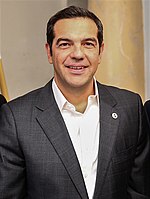Alexis Tsipras, Date of Birth, Place of Birth
TweetAlexis Tsipras
Greek politician
 Date of Birth: 28-Jul-1974
Date of Birth: 28-Jul-1974
 Place of Birth: Athens, Attica Region, Greece
Place of Birth: Athens, Attica Region, Greece
Profession: politician, civil engineer
Nationality: Greece
Zodiac Sign: Leo 
atsipras
tsiprasalexis
alexistsipras
About Alexis Tsipras
- Alexis Tsipras (Greek: ?????? ?s?p?a?, pronounced [a'leksis 't?sipras]; born 28 July 1974) is a Greek politician serving as Leader of the Opposition since 2019.
- The leader of left-wing party Syriza since 2009, he served as Prime Minister of Greece from 2015 to 2019.A socialist, Tsipras has been Leader of the Coalition of the Radical Left (Syriza), a left wing political party, since 2009.
- He is the fourth Greek Prime Minister who has governed in the course of the 2010s government-debt crisis.
- Originally an outspoken critic of the austerity policies implemented during the crisis, his tenure in office has been marked by an intense austerity policy, mostly in the context of the third EU bailout to Greece (2015–2018). Tsipras was born in Athens in 1974.
- He joined the Communist Youth of Greece in the late 1980s and in the 1990s was politically active in student protests against education reform plans, becoming the movement's spokesperson.
- He studied civil engineering at the National Technical University of Athens, graduating in 2000, later undertaking post-graduate studies in urban and regional planning.
- He worked as a civil engineer in the construction industry, based primarily in Athens. From 1999 to 2003, Tsipras served as the secretary of Synaspismos Youth.
- He was elected as a member of the Central Committee of Synaspismos in 2004 and later the Political Secretariat.
- In the 2006 local election, he ran as Syriza's candidate for Mayor of Athens, winning 10.5%.
- In 2008, he was elected as Leader of Syriza, succeeding Alekos Alavanos.
- He was first elected to the Hellenic Parliament representing Athens A in the 2009 election and was re-elected in May and June 2012, subsequently becoming Leader of the Opposition and appointing his own shadow cabinet. In January 2015, Tsipras led Syriza to victory in a snap legislative election, winning 149 out of 300 seats in the Hellenic Parliament and forming a coalition with the Independent Greeks.
- On 20 August 2015, seven months into his term as prime minister he lost his majority after intraparty defections, announced his resignation, and called for a snap election to take place the following month.
- In the September 2015 election that followed, Tsipras led Syriza to another victory, winning 145 out of 300 seats and re-forming the coalition with the Independent Greeks.
- During his premiership, he has overseen negotiations regarding the Greek government-debt crisis, initiated the Greek bailout referendum and responded to the European migrant crisis.
- In 2015, he was named by TIME magazine as one of the 100 most influential people globally.As Prime Minister of Greece, the opposition parties have accused Tsipras among other things of having capitulated to enacting increasingly harsh austerity measures to keep his country on the surface in contrast with his pre-election promises and also of having exacerbated problems that already existed in the Greek economy, with the country having lost about 25% of its GDP since the start of the crisis.
Read more at Wikipedia

